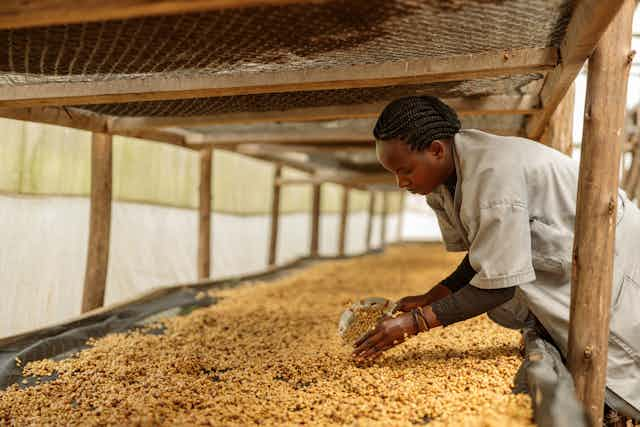The EU parliament has just approved sweeping new rules that will require companies to avoid and mitigate human rights and environmental abuses in their supply chains.
These are noble aims. They have been a long time coming. But without careful design and more proactive support for business and suppliers in the developing world, there are real risks of well-intentioned policies putting the poorest countries in a “green squeeze”.
The current concerns – voiced by many different types of developing countries – are that the new EU green trade measures are penalising poorer producers exporting into the bloc, and all to address a climate crisis they didn’t cause.
Without more focused support, the EU risks undermining its existing partnerships with developing nations to support global development and trade goals.
The world’s 45 least developed countries may only account for 1% of global merchandise trade but they are home to a quarter of the world’s population, some of them the world’s poorest people. They have limited domestic markets and, because of historical trade (including colonial) relations, typically rely on EU markets and supply chains for around 15%-20% of their exports.
Without accompanying support, the combined effects of the new green trade measures risk increasing barriers to trade that would reduce extreme poverty. The resulting reductions in revenue impede not only development goals, but also efforts by the poorest countries to adapt to climate change.
It’s ironic, because these countries have contributed the least emissions to the climate crisis and are already footing the bill.
A ‘green squeeze’ for the poorest countries
My analysis suggests the combined impact of the current and planned measures may entail a “green squeeze”, costing potentially hundreds of millions in new compliance costs. For instance, new EU deforestation regulations alone could set some of the poorest countries’ exports back by 10% and reduce an individual country’s GDP by 1%.
In Ethiopia, where colleagues and I have modelled the economic data for forthcoming research, there could be up to a US$1.13 billion (£880 million) reduction in GDP annually. This is because increasing compliance costs exclude producers unable to cover them, and exports will be reduced. And this figure doesn’t factor in all the likely knock on effects on consumption, investment, tax revenues, wages, employment and government expenditure. Ethiopia isn’t unique: a similar situation is playing out in other poorer countries exporting goods into the EU.
Some adjustments have been made in relation to the European Green Deal, a set of policies aimed at making the EU carbon neutral by 2050.
For example, the deforestation regulation had initially sought to classify countries as high, low or standard risk of their exports being linked to deforestation. But from December 2024, the regulation will apply a standard risk to all countries, which is good news for exporters that source from countries that could have been classified as high risk – like Brazil.

However, even a standard risk classification still requires products and their supply chains to be fully traceable. And there will still be checks on 3% of operators and traders (compared to 9% if countries were classified as high risk). Businesses may need more time to adapt.
There are already reports that EU coffee importers are sourcing less from Ethiopia because they are concerned growers will not be able to comply. Business is already gravitating away from some poorer and cheaper countries towards those where deforestation is considered a lower risk and that already have systems in place to trace the environmental impact of goods.
The EU’s directive on corporate sustainability due diligence has just been approved. From a developing country perspective, it imposes various compliance costs which are more easily absorbed by larger firms. As one major African fruit products exporter, Blue Skies, told me, the barrage of new audit and compliance measures will mean duplicated paperwork, travel and consultancy fees, adding £1 million in annual costs, just to maintain access to its existing markets.
From 2026, the EU’s carbon border adjustment mechanism will require importers of certain emissions-intensive goods like cement, iron and steel, aluminium, and fertilisers, to pay for the carbon embodied in these goods. The EU has responded to concerns that the reporting requirements are too complex. But we can expect more issues to be raised once companies are required to report the emissions embodied in goods they import.
Of course, wealthy countries must urgently decarbonise trade and production. This is not an argument against action on climate change. Instead, it is a plea for policymakers to seriously consider how to ensure new green trade opportunities arise, in line with the UN’s global commitment to double the poorest countries’ share of global exports (a goal unmet since its target year of 2020).
What could this look like? The EU, for a start, could articulate and offer more joined-up packages of support - ones that take better account of country specific circumstances and production systems. Listening to countries that have asked for more time to adapt, like Ethiopia, would be a good place to start. Meanwhile aid-for-trade support for adjustment needs to increase.
New green trade measures can and should complement development goals. This way we can avoid the green squeeze and avoid hurting the poorest countries.
Article updated on April 26 to reflect the fact the EU parliament has now passed the corporate sustainability due diligence directive.

